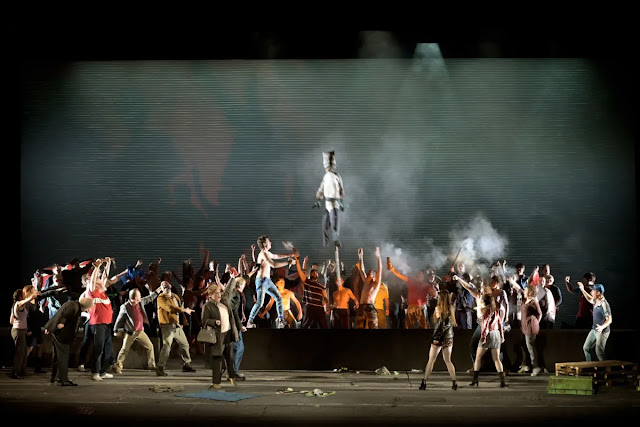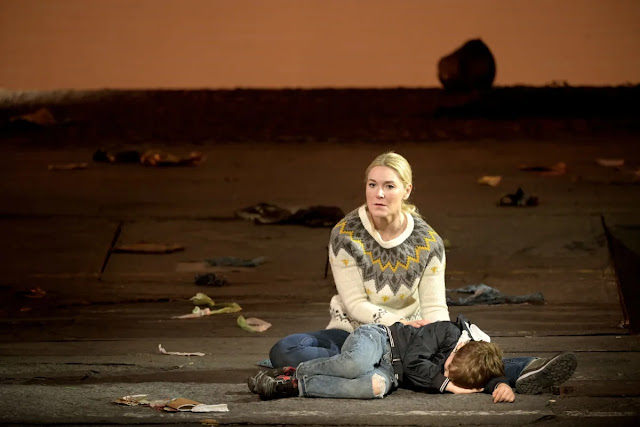 |
| Britten: Peter Grimes - Simon Keenlyside, Allan Clayton - Paris Opera (Photo Vincent Pontet/OnP) |
Benjamin Britten: Peter Grimes; Allan Clayton, Maria Bengtsson, Simon Keenlyside, director: Deborah Warner, conductor: Alexander Soddy; Paris Opera at Palais Garnier
Reviewed 29 January 2023
A profoundly beautiful and thoughtful account of the title role allied to Warner's remarkably rethought and disturbing contemporary production make for a Peter Grimes that is outstanding in all ways
We missed the new production of Benjamin Britten's Peter Grimes at Covent Garden last year owing to illness, but as the production is shared between Madrid, London, Paris and Rome, we were able to treat ourselves to a January trip to Paris to see it. Deborah Warner's production of Peter Grimes opened at the Palais Garnier on 26 January 2023, conducted by Alexander Soddy and we caught the second performance on 29 January 2023.
The cast was virtually unaltered from London, with Allan Clayton as Peter Grimes, Maria Bengtsson as Ellen Orford, Simon Keenlyside as Bulstrode, John Graham Hall as Bob Bowles, Jacques Imbrailo as Ned Keene, Catherine Wyn-Rogers as Auntie, Rose Aldridge as Mrs Sedley, Stephen Richardson as Hobson, John Gilchrist as Revd Horace Adams, Clive Bayley as Swallow and Anna-Sophie Neher and Ilanah Lobel-Torres as the nieces.
 |
| Britten: Peter Grimes - Paris Opera (Photo Vincent Pontet/OnP) |
Deborah Warner and designers Michael Levine (sets) and Luis F. Carvalho (costumes) have set the production in the present day, emphasising the poverty of the community's inhabitants, something implicit in Crabbe but which can get rather fudged in historical productions. Michael Levine's sets were simple yet effective, not only with some lovely poetic touches (the floating boat at the opening) alongside the naturalism. But a big influence on the design must surely have been Timothy O'Brien's designs for Elijah Moshinsky's ground-breaking 1975 production at Covent Garden (also seen in Paris in 1976 with Jon Vickers) with its stripped-down look and use of the cyclorama as backdrop.
We were particularly struck by the design of the inn scene, the inn floor being below stage level thus creating an intriguing look and allowing Allan Clayton's Peter Grimes to climb onto the real stage level thus emphasising his separation from the community. Warner's approach mixed naturalism and poetry, but the whole production was grounded in a detailed and illuminating approach to character. There was no caricature here, each member of the community was laid out before us, providing a strong community anchor for the mob violence in Acts Two and Three. This was a wonderfully vivid picture of the Borough and more than justified the decision to bring the piece into the present day. This also meant that wilst remaining true to the music, Warner helped rethink some of the characters.
The mob included the inevitable skinhead youth element that brought a disturbing element of violence to the mix, including threatening Maria Bengtsson's Ellen Orford. But in Act Three particularly, I felt that the way Warner shaded the mob towards neo-fascist behaviour was trying to push the music further than it wished to go. And the chorus' final on-stage entries, those astonishing cries of 'Peter Grimes', each one answered by silence, were counterpointed with the waving of a dummy figure, a visual distraction that took some of the sting out of the music.
 |
| Britten: Peter Grimes - Allan Clayton - Paris Opera (Photo Vincent Pontet/OnP) |
Peter Grimes is one of those operas where our conception of the voices types of the principals has become more malleable. The two leading roles were written for a dramatic soprano (Joan Cross was a fine Sieglinde and Marschallin) and lyric tenor, but since then the roles have become the province also of lyric sopranos and dramatic tenors. Jon Vickers was a simply astonishing Peter Grimes (I was lucky enough to see him in the role in 1984), the way he used his head voice for moments like 'The Great Bear', but also unforgettable was the way his voice opened up and imposed itself on the ensemble at Peter Grimes' entry into the round during the inn scene.
Clearly Allan Clayton had no interest in this sort of portrayal, he remained at all times embedded in the musical ensemble. Live Vickers, Clayton was physically imposing and the moments of violence were disturbing. But Clayton's performance was notable for its poetry and lyricism, this was perhaps the most beautifully sung account of the role I have come across.
From the outset, it was clear that this Grimes was a haunted dreamer, the prologue played out in Grimes' mind, and here and in other places the vision of the dead apprentice (aerialist Juan Leiba) appeared. The naturalism of Warner's overall approach meant that these poetic moments really tole. Grimes' entry into the inn with Clayton singing 'The Great Bear' to himself, face embedded in the door with us only seeing his back, was truly remarkable. Such moments highlighted Grimes' strangeness, the sense of other. He was a prime candidate for being singled out by the mob.
In Act Two, Clayton made us see and feel Grimes' frustrations which took on a physical element, yet there were moments when he reined himself in. A word here about the apprentice (shared between Tancrede Renaud and Simon Milhaud), here played with scene-stealing aplomb. The scenes between the apprentice, Grimes, and Ellen Orford were riveting. Grimes' final scene on the beach was a long way from Jon Vickers' histrionic mad scene, here Clayton gave us something very interior and highly disturbing.
 |
| Britten: Peter Grimes - Maria Bengtsson - Paris Opera (Photo Vincent Pontet/OnP) |
We perhaps sometimes forget that Ellen Orford was written for the same commanding voice that sang Gloriana and Lady Billows. Here, Maria Bengtsson's voice felt a half-size too small for the role. She she never pushed and this remained a very fine and complex portrayal. In Act Two, in particular, she was finely moving and gave us a sense of Ellen Orford being equally an outsider as Grimes. The visual clues were all there in the dress and body language or this middle-class woman, a lone teacher in this deprived and violent community.
A word here about Alexander Soddy's conducting. He and the orchestra produced a fine, rich and at times romantic account of the score. But I felt that in this house with its relatively shallow pit (Soddy was making his house debut) he could have been more sympathetic to balance and all the female soloists had moments when the orchestra was too dominant.
 |
| Britten: Peter Grimes - Allan Clayton Paris Opera (Photo Vincent Pontet/OnP) |
There is something unsettling about Auntie, the way she combines comfortable landlady with something else, seeing both sides. Here Catherine Wyn Rogers was wonderfully unsettling with her down-at-heel Auntie, a character almost lifted from a Soap, strongly drawn and brilliantly conveyed. Rosie Aldridge was similarly apposite as the obsessive Mrs Sedley. Like most mezzo-sopranos, the lower depths of the role were a challenge, but one that she did not shirk. Anna-Sophie Neher and Ilanah Lobel-Torres as the nieces sparky and knowing.
The chorus was in good form, singing English to the manner born and entering into Warner's conception with a will. This has always been something of a chorus-driven opera and here the vivid performance from the Paris Opera chorus created the denizens of the Borough as a character in their own right.
Soddy drew fine playing from the orchestra, bringing out a richness of texture and lyricism in the score. The Interludes seemed quite measured but full of beauty, and there was some lovely orchestral detail throughout. The interludes were used as such, with a drop curtain down which is almost certainly what Britten envisaged, but it did mean that the music was accompanied by stage noise.
 |
| Britten: Peter Grimes - Simon Keenlyside, Maria Bengtsson - Paris Opera (Photo Vincent Pontet/OnP) |
It is worth bearing in mind that for all its grandeur of conception, Peter Grimes was written to be performed in Sadler's Wells Theatre, not the biggest venue at the best of times. It is to everyone's credit that this production and these performers expanded the work to fill the Palais Garnier in a way that seemed quite natural.
Never miss out on future posts by following us
The blog is free, but I'd be delighted if you were to show your appreciation by buying me a coffee.
Elsewhere on this blog
- A virtuosic cascade of ecstatic and endless deep listening: The Hermes Experiment with Shiva Feshareki - concert review
- Part of her musical journey: violinist Esther Yoo chats about recording the Barber and Bruch concertos - interview
- Mangling Médée: why are stylistically appropriate performances of Cherubini's opera so rare? - feature
- Faces in the Mist: the first disc devoted to Richard Peat's striking and evocative music - record review
- Lyricism, melancholy & sadness: pianist Ruth McGinley & composer Neil Martin collaborate on Aura - record review
- Style and elegance: with Bach-Abel Society, Les Ombres take us back to the elegant evenings of the Bach-Abel concerts in 18th-century London - record review
- Party! London's LGBT+ community choir, the Pink Singers celebrate 40 years at the Cadogan Hall - concert review
- Aural Adventures: the Colin Currie Quartet and Liam Byrne launch Sound Unwrapped at Kings Place - concert review
- Advocating for a sense of classicism: conductor Alexander Shelley on recording the music of Robert Schumann, Johannes Brahms and Clara Schumann - interview
- Handel the European: two concerts showcasing the diversity & imagination of Handel's cantatas - concert review
- Intercourse of Fire and Water: Idlir Shyti in programme for solo cello that mixes late Romanticism with contemporary - record review
- Home











No comments:
Post a Comment